Grammar动词的ing形式作定语表语和宾语补足语
英语动词-ing作表语、定语、宾语补足语
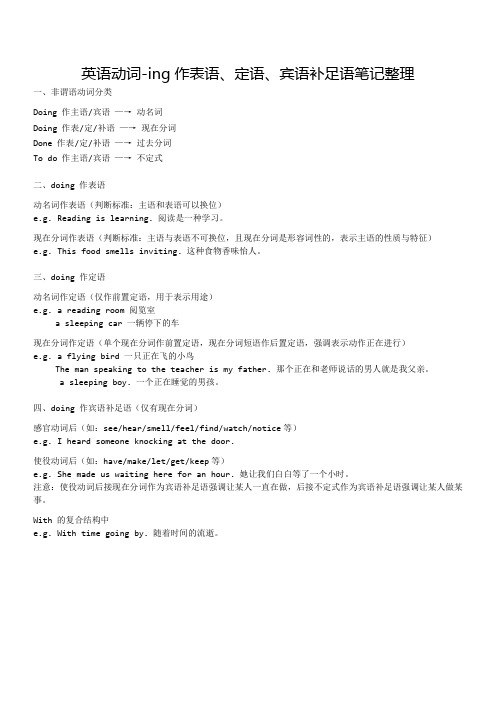
英语动词-ing作表语、定语、宾语补足语笔记整理一、非谓语动词分类Doing作主语/宾语—→动名词Doing 作表/定/补语—→现在分词Done 作表/定/补语—→过去分词To do 作主语/宾语—→不定式二、doing 作表语动名词作表语(判断标准:主语和表语可以换位)e.g. Reading is learning. 阅读是一种学习。
现在分词作表语(判断标准:主语与表语不可换位,且现在分词是形容词性的,表示主语的性质与特征)e.g. This food smells inviting. 这种食物香味怡人。
三、doing 作定语动名词作定语(仅作前置定语,用于表示用途)e.g. a reading room 阅览室a sleeping car 一辆停下的车现在分词作定语(单个现在分词作前置定语,现在分词短语作后置定语,强调表示动作正在进行)e.g. a flying bird 一只正在飞的小鸟The man speaking to the teacher is my father. 那个正在和老师说话的男人就是我父亲。
a sleeping boy. 一个正在睡觉的男孩。
四、doing 作宾语补足语(仅有现在分词)感官动词后(如:see/hear/smell/feel/find/watch/notice等)e.g. I heard someone knocking at the door.使役动词后(如:have/make/let/get/keep等)e.g. She made us waiting here for an hour. 她让我们白白等了一个小时。
注意:使役动词后接现在分词作为宾语补足语强调让某人一直在做,后接不定式作为宾语补足语强调让某人做某事。
With 的复合结构中e.g. With time going by. 随着时间的流逝。
20-21版:Grammar——动词-ing形式作表语、定语和宾语补足语(创新设计)
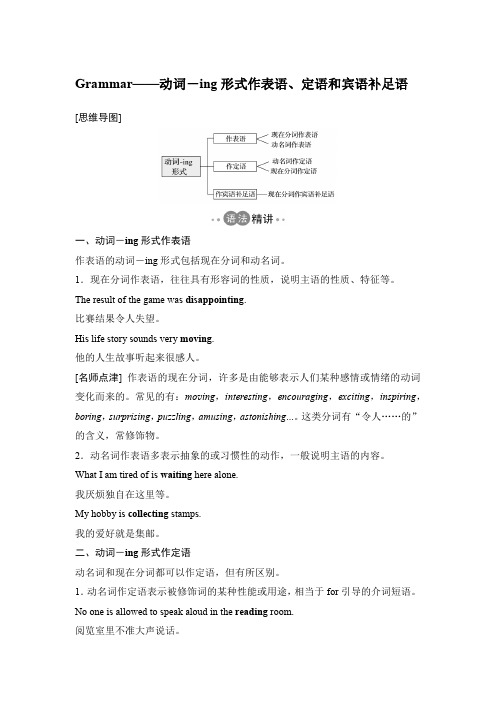
Grammar——动词-ing形式作表语、定语和宾语补足语[思维导图]一、动词-ing形式作表语作表语的动词-ing形式包括现在分词和动名词。
1.现在分词作表语,往往具有形容词的性质,说明主语的性质、特征等。
The result of the game was disappointing.比赛结果令人失望。
His life story sounds very moving.他的人生故事听起来很感人。
[名师点津] 作表语的现在分词,许多是由能够表示人们某种感情或情绪的动词变化而来的。
常见的有:mo v ing,interesting,encouraging,exciting,inspiring,boring,surprising,puzzling,amusing,astonishing...。
这类分词有“令人……的”的含义,常修饰物。
2.动名词作表语多表示抽象的或习惯性的动作,一般说明主语的内容。
What I am tired of is waiting here alone.我厌烦独自在这里等。
My hobby is collecting stamps.我的爱好就是集邮。
二、动词-ing形式作定语动名词和现在分词都可以作定语,但有所区别。
1.动名词作定语表示被修饰词的某种性能或用途,相当于for引导的介词短语。
No one is allowed to speak aloud in the reading room.阅览室里不准大声说话。
2.现在分词作定语时,它和被修饰词之间有逻辑上的主动关系,表示所修饰词进行的动作,相当于一个定语从句。
The boy playing football on the playground is my younger brother.=The boy that/who is playing football on the playground is my younger brother.在操场上踢足球的那个男孩是我弟弟。
Grammar(v-ing形式作定语和状语)

格结构, 也就是给现在分词补充一个主语。)
用动词的-ing形式改写下列句子: 1. The picture that hangs on the wall is a world-famous one. The picture _h_a_n_g_i_n_g on the wall is a world-famous one. 2. Because he hadn’t received an answer, he decided to write another letter to him. _N_o_t_h_a_v_in_g__re_c_e_iv_e_d_ an answer, he decided to write another letter to him.
5) He came running back to tell me the
news.
方式
6) (When) Hearing the news, he got frightened. = When he heard the news, he got frightened.
(时间, 可以在分词前保留when )
2. 作状语 可以表示时间、 原因、结果、条件、
行为方式或伴随动作等。
Using your head, you’ll find a good
way.
条件
1) Four people entered the room looking around in a curious way. = Four people enter the room and looked around in a curious way.
英语Grammar
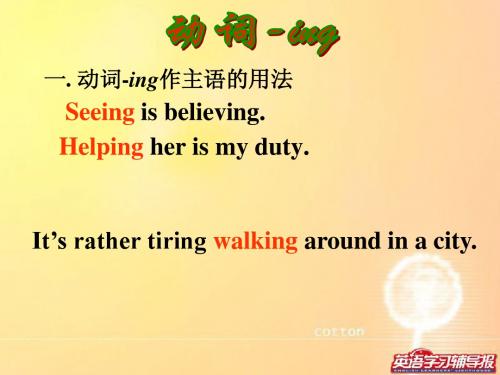
Seeing is believing. Helping her is my duty.
It‟s rather tiring walking around in a city.
不定式作主语往往表示具体的特别是将来的动 作。如:
It‟s no use crying over spilt milk.
C 9. The story was so funny that we ___.
A. couldn‟t help laugh
B. can‟t but laugh
C. couldn‟t help laughing
D. couldn‟t help but to laugh
10. Though it sounds a bit too dear, it is worth ______. B A. being bought B. buying C. to buy D. buying it 11. He devoted his life to _____ C the atomic theory. A. study B. be studied C. studying D. have studied
意义没有区别。如:
后跟动名词的主动式或不定式的被动式作宾语,
The window needs/requires/wants
cleaning/to be cleaned.
4. 动词forget, go on, mean, regret, remember, stop, try, be used to, can„t help 等后跟动名词和跟不定式区别较大,
考例
D that with them. 1. I can‟t imagine _____ A. do B. to do C. being done D. doing 2. She looks forward every spring to D the flower-lined garden. _____ A. visit B. paying a visit C. walk in D. walking in
【免费下载】4 Unit 3 Grammar 动名词作表语定语宾语补足语
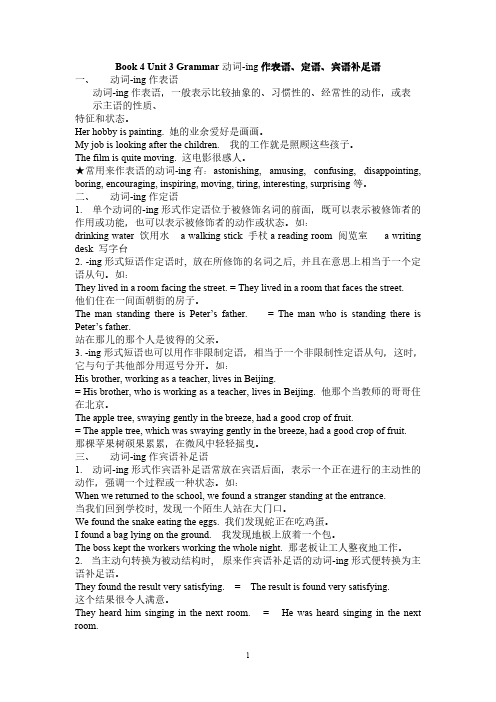
Book 4 Unit 3 Grammar动词-ing作表语、定语、宾语补足语一、动词-ing作表语动词-ing作表语,一般表示比较抽象的、习惯性的、经常性的动作,或表示主语的性质、特征和状态。
Her hobby is painting. 她的业余爱好是画画。
My job is looking after the children. 我的工作就是照顾这些孩子。
The film is quite moving. 这电影很感人。
★常用来作表语的动词-ing有:astonishing, amusing, confusing, disappointing, boring, encouraging, inspiring, moving, tiring, interesting, surprising等。
二、动词-ing作定语1. 单个动词的-ing形式作定语位于被修饰名词的前面,既可以表示被修饰者的作用或功能,也可以表示被修饰者的动作或状态。
如:drinking water 饮用水 a walking stick 手杖a reading room 阅览室 a writing desk 写字台2. -ing形式短语作定语时, 放在所修饰的名词之后, 并且在意思上相当于一个定语从句。
如:They lived in a room facing the street. = They lived in a room that faces the street.他们住在一间面朝街的房子。
The man standing there is Peter’s father. = The man who is standing there is Peter’s father.站在那儿的那个人是彼得的父亲。
3. -ing形式短语也可以用作非限制定语,相当于一个非限制性定语从句,这时,它与句子其他部分用逗号分开。
如:His brother, working as a teacher, lives in Beijing.= His brother, who is working as a teacher, lives in Beijing. 他那个当教师的哥哥住在北京。
高中Grammar动词-ing形式的用法 公开课
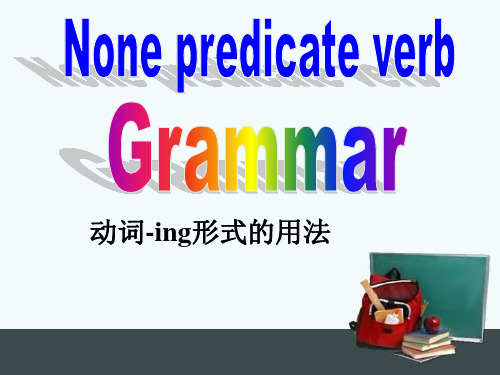
finish the work on time.
3.用于with复合结构中。
with+宾语+doing With so many people with+宾语+to do looking at her,she with+宾语+done felt nervous.
(burn) all night.
2.常见结构: 动词-ing形式常做以下动词的宾语补足 语。
1).表示“感觉”的感官动词:
feel, smell, listen to,hear, watch,see,
+
宾语 + (sb/sth)
宾补 (doing)
notice,observe V-ing形式作宾语补足语
have, keep,get, leave,let, set,make,
+
宾(sb语/sth)+
宾补 (doing)
send ①We won’t have you _d_o_i_n_g_(do) that. ②The workers kept the machines
__ru__n_n_in_g_ (run) all night long to
2.现在分词(短语)做定语 1)作用:表示所修饰名词的_动__作__或_状__态___, 2) 位置:单个的现在分词做定语时,放 被修饰词__前__; 现在分词短语做定语时, 则放在被修饰词__后___。
a running man 一个奔跑的男人
The man running in
the picture is Liu Xiang. 图片中跑步的男人是刘翔。
英语必修五unit1语法

pay sb. by the hour” 计时给某人报酬。 此题被动结构作表语。类似的有:get
burnt, get hurt , get wounded.
• What he has done is really __C__.Now his parents are _____ him.
③ She was very disappointed to hear the result.
④ He’s quite experienced in teaching beginners.
现在分词和过去分词作表语的区别
• V-ing 形式表示“令人……的” • V-ed 形式表示“某人感到……的”
2. 作定语的动词-ing形式如是一个短语,则 应放在被修饰词的后面,做后置定语,相当 于一个定语从句。
Do you know the boy playing basketball? (=who is playing basketball) 你ciple as attribute & predicative
①过去分词做定语:表被动,表完成。 ②现在分词作定语:表主动,表进行。 ③不定式作定语:表示将要发生的动作。
区别 2
Falling leaves Fallen leaves
区别 2
1. Falling leaves 2. Fallen leaves 3. Disappointing news 4. Disappointed people 5. Exciting story 6. Excited people 7. Tired people/ I’m tired 8. Tiring film
ago. 我们要去看那座建于几百年前的桥。
Grammar之过去分词作定语,表语和宾补及状语

2、根据中文完成下列句子。
(1)他们对眼前悲惨的景象感到很害怕。 They were frightened ———————————— at the sad sight. (2)中国分秒必争,以便赶上发达国家。 developed countries China has no time to lose to catch up withthe _________________ in the world.
过去分词概述
@过去分词具有动词的性质,同时 兼有形容词或副词的性质,在句中 可以作表语、定语、状语和补足语. @过去分词有规则和不规则之分。规 则的就是在动词原形之后加-ed.
一.动词过去分词作定语的位置
.单个的过去分词或由过去分词构成的复合形容词作 定语一般放在所修饰词的前面,称为前置定语。 过去分词短语作定语通常放在被修饰的词后面,称 为后置定语。
→
五.注意点
过去分词、现在分词的被动语态和动词不定 式的被动语态作定语意义的不同。 eg:1.Most of the guests invited to the party were her classmates. 2.The shopping centre being built was designed by Mr. Wang. 3.The building to be finished next year will be our new theatre.
Grammar
The Past Participle used as Attribute and Predicative
广水市实验高中 liyueqin
复习定语与表语的概念
:是谓语的一部分, 位于系动词之后,说明主语身份、 特征或状态。
高一英语doing

全析提示:
1. 动名词短语不能作定语,单个的动名词可 以用作定语,但仅作前置定语。
如 working method=method for working 工作方法
2. 单个分词和分词短语都可作定语,单个分 词一般作前置定语,分词短语则作后置定 语,相当于一个定语从句。
如:the man visiting Japan=the man who is visiting Japan 访日的那个人。
4. He was in hospital for six months. He felt as if he was ______ from the outside world. A. cut out B. cut off C. cut up D. cut through 解析:cut out的意思是“切下;删除”。cut off意思是“切断;使(人、城镇)孤立”。cut up的意思是“切碎”。cut through的意思 是“穿越”。本句的意思是:他住院六个月感 到似乎与外界隔绝了。
3. When we watched the national flag ______ in the Olympic Games on TV, we raised a cheer. A. rise B. being risen C. raised D. being raised
解析:本题考查分词作补语,rise是不及物动 词,先排除A、B两项,国旗是被人们升起的, 应该用分词的被动形式,句意为:当看到电 视中奥林匹克运动会上国旗正在被升起时, 我们欢呼起来。
三、动词-ing形式作宾补
动名词不能作宾语补足语。现在分词作宾 补表示的是正在发生的动作。例如: 我看见他正在上楼。 I saw him going upstairs. 我们看着她在过大街。 We watched her crossing the street. 我们听见她在房间里唱歌。 We heard her singing in her room。
20-21版:Grammar——动词-ing形式作主语和宾语(创新设计)

Yesterday being Sunday postponed the match. 昨天是星期天,比赛推迟了。(作主语) She is fond of coffee being served after dinner. 她喜欢饭后喝点咖啡。(作宾语)
14
@《创新设计》
本节内容结束
15
8
@《创新设计》
5.有些动词,后接动词-ing形式作宾语,与用动词不定式作宾语,意义大相径庭。
try to do sth尽力做某事
try doing sth
试着做某事
mean to do sth打算/意欲做某事
mean doing sth
意味着某事
forget to do sth忘记去做某事
forget doing sth
4
2.置于句末,用it作形式主语,多见于下面几个句型: It is worth doing...做……是值得的 It+be+a waste of time doing...做……是浪费时间的 It is/was no good/use doing...做……是没有好处/用处的 It is a waste of time talking about such useless things. 谈论这些没用的事情是在浪费时间。 It is no use crying over spilt milk. 覆水难收。
12
@《创新设计》
③代词宾格+动词-ing Can you imagine him/Jack cooking at home? 你能想象他/杰克在家做饭的样子吗? ④名词+动词-ing The baby was made awake by the door suddenly shutting. 这个婴儿被突然的关门声吵醒了。 [名师点津] (1)动词-ing形式的复合结构可在句中作主语或宾语。作主语时,不能用③④两种形式。 (2)无生命名词无论是作主语还是作宾语都不能用第②种形式。
grammar--过去分词做定语和一般过去式

grammar--过去分词做定语和⼀般过去式Grammar —The -ed form used as attributives and the simple past tense⼀. 过去分词(短语)做定语分词是动词的⼀种⾮谓语形式,在句中可做定语、状语、补⾜语和表语。
有两种形式,⼀种是现在分词(v.-ing),⼀种是过去分词(v.-ed)。
现在分词⼀般表⽰主动和进⾏的意思,过去分词⼀般表⽰被动和完成的意思。
以下主要是过去分词(短语)做定语的⼏点⽤法。
1. 及物动词的过去分词做定语,表被动和完成。
a broken cup ⼀个破杯⼦ a wounded soldier ⼀个受伤的⼠兵respected leaders 受⼈尊敬的领导们trained camels 受过训练的骆驼们an abandoned farm ⼀个废弃的农场2. 不及物动词的过去分词没有被动的意义,只表⽰动作的完成.a grown woman ⼀位成年妇⼥an escaped prisoner⼀名逃犯a fallen tree ⼀棵倒下的树the retired manager 退休经理fallen leaves 落叶the risen sun 已升起的太阳3. 过去分词可构成合成词作定语。
man-made satellite ⼈造卫星half-finished products 半成品highly-developed industry ⾼度发达的⼯业widely-used language ⼴泛应⽤的语⾔4. 过去分词或短语作定语时,相当于⼀个定语从句。
the color TV set produced last year =the color TV set that were produced last year 去年⽣产的彩⾊电视机a letter written by my daughter =a letter which/that is written by my daughter ⼀封我⼥⼉写给我的信a young girl dressed in white= a young girl who was dressed in white⼀个穿⽩⾐服的年轻⼥孩the food cooked by experts = the food which/that was cooked by experts 烹饪专家做的⾷物5. 过去分词做定语的位置:1)单个的过去分词作定语常放在所修饰的名词之前,叫前置定语。
grammar现在分词
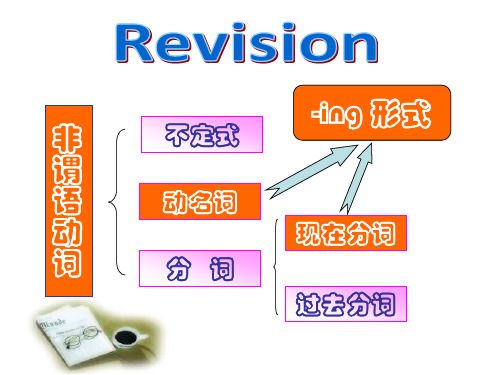
不定式和分词作状语的区别
不定式能做目的状语和表示意料之外的结果状 语(这时,前面常带only) 分词(包括现在分词和过去分词)能做时间、 条件原因、伴随、让步、方式或表示自然结果 的状语。比较: He hurried to the station,only to find the train had left. In order to catch the early bus , he got up early. The flood was rising, washing two bridges away.
2. The bottle _c_o_n_t_a_in_i_n_g(contain) the poison was sent to the laboratory.
3. Our trip was _d_i_sa_p_p__o_in_t_in__g__ (disappoint). We did not find any unusual plants.
三、现在分词的语法功能 1: Attribute定语
1. a running man
2. The man running in the picture is Liu Xiang.
= The man who is running in the picture is Liu Xiang.
小 结:
1. V-ing形式作定语可表示主语所 作动作正在进行或表示和所修饰词
• The students came
in,__f_o_l_lo__w__in_g____(follow)their
teacher.
• My cousin came to see me from
the country,__b__r_in_g__in__g___
人教版高中英语必修四Unit 3《A taste of English humour》(Section 2)ppt课件1
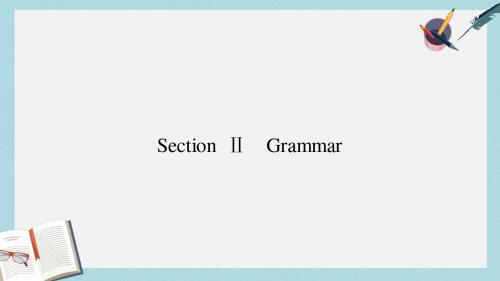
编后语
• 常常可见到这样的同学,他们在下课前几分钟就开始看表、收拾课本文具,下课铃一响,就迫不及待地“逃离”教室。实际上,每节课刚下课时的几分 钟是我们对上课内容查漏补缺的好时机。善于学习的同学往往懂得抓好课后的“黄金两分钟”。那么,课后的“黄金时间”可以用来做什么呢?
• 一、释疑难 • 对课堂上老师讲到的内容自己想不通卡壳的问题,应该在课堂上标出来,下课时,在老师还未离开教室的时候,要主动请老师讲解清楚。如果老师已
语法指南
2.动词-ing形式做定语 (1)动词-ing形式做定语,表示其动作是所修饰的名词发出的,表示 动作正在进行。单个的动词-ing形式做定语时应放在所修饰名词 的前面;若是动词-ing短语做定语时,应放在所修饰词之后。 a smiling face一张笑脸 a leading figure一个领导人 动词-ing形式还能构成合成词做定语。例如: an easy-going man一个好相处的人 动词-ing短语做定语,常放在被修饰词的后keep,leave,have,set,catch等动词后表示宾语持续或进行 的动作,如:
Finally they got the new machine working again. 最后他们又使新机器运转起来了。 His remark left me wondering what he was driving at. 他的话使我摸不清到底是什么意思。 注意:省略to的不定式做宾语补足语,表示动作全过程,即已经发 生。 We saw the thief enter the store. 我们看见那小偷进了那家商店。
Section Ⅱ Grammar
语法指南
动词-ing形式做表语、定语和宾语补足语 1.动词-ing形式做表语 (1)动词-ing形式做表语是用来说明主语的具体内容。在这种情 况下,主语和表语通常是对等的关系,可互换位置。 The police’s job is keeping public order. 警察的工作就是维护公共秩序。 Keeping the money you pick up is stealing. 留下你捡到的钱就是偷。 注意:不定式和动词-ing形式做表语一般没有多大区别,只是不定 式做表语有时表示将来,动词-ing形式做表语表示一般抽象的情况。
PartⅡGrammar——动词ing形式作表语定语和宾语补足语
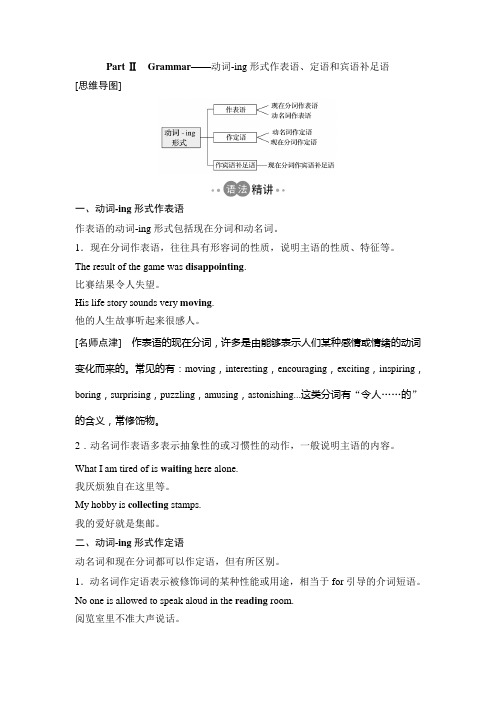
Part ⅡGrammar——动词-ing形式作表语、定语和宾语补足语[思维导图]一、动词-ing形式作表语作表语的动词-ing形式包括现在分词和动名词。
1.现在分词作表语,往往具有形容词的性质,说明主语的性质、特征等。
The result of the game was disappointing.比赛结果令人失望。
His life story sounds very moving.他的人生故事听起来很感人。
[名师点津]作表语的现在分词,许多是由能够表示人们某种感情或情绪的动词变化而来的。
常见的有:moving,interesting,encouraging,exciting,inspiring,boring,surprising,puzzling,amusing,astonishing...这类分词有“令人……的”的含义,常修饰物。
2.动名词作表语多表示抽象性的或习惯性的动作,一般说明主语的内容。
What I am tired of is waiting here alone.我厌烦独自在这里等。
My hobby is collecting stamps.我的爱好就是集邮。
二、动词-ing形式作定语动名词和现在分词都可以作定语,但有所区别。
1.动名词作定语表示被修饰词的某种性能或用途,相当于for引导的介词短语。
No one is allowed to speak aloud in the reading room.阅览室里不准大声说话。
2.现在分词作定语时,它和被修饰词之间有逻辑上的主动关系,表示所修饰词进行的动作,相当于一个定语从句。
The boy playing football on the playground is my younger brother.=The boy that/who is playing football on the playground is my younger brother.在操场上踢足球的那个男孩是我的弟弟。
Unit 3 Section Ⅳ Grammar & Writing
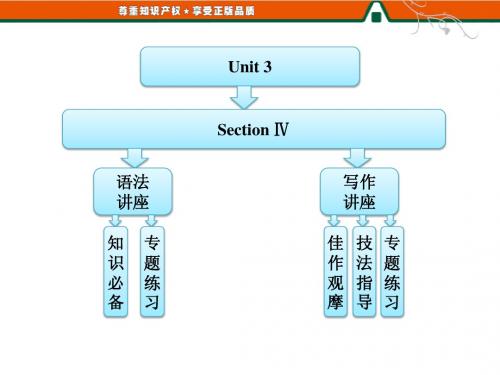
返回
2-2 (2012· 湖南高考)The lecture, ________ at 7:00 pm last night,was followed by an observation of the moon with
telescopes.
A.starting C.to start B.being started D.to be started
family ________ next to my door. A.living C.lived B.to live D.having lived
解析:选A。 考查非谓语动词。句意:我在这儿住了二
十年了,却不认识就住在我隔壁的那家人。动词ing形
式作定语,相当于定语从句who live。
返回
5.—What is Mr Black?
返回
4.用于with复合结构中。
I couldn't do my homework with the noise going on.
由于噪音不断,我没法做家庭作业。 With so many people looking at her, she felt nervous. 这么多人看着她,她感到很紧张。
返回
[考题印证2] 2-1 (2013· 山东高考)The room is empty except for a bookshelf ________ in one corner. A.standing B.to stand
C.stands
D.stood
解析: 选A。考查非谓语动词。句意:除了一个书橱在墙角 外,房间里空空荡荡。except for是介词短语,其后不能接 句子,所以排除C、D两项。分析句子结构可知,此处为非 谓语,且a bookshelf与动词stand之间为逻辑上的主动关系, 所以选A。
grammar现在分词做定语、表语和宾补的用法必备
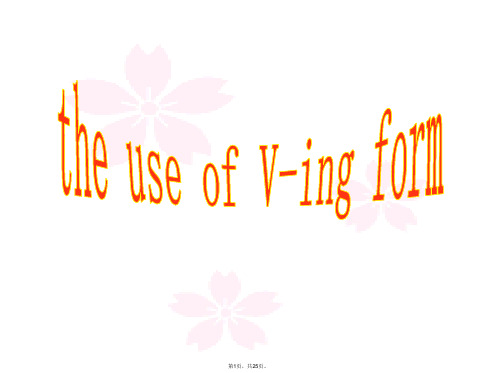
a swimming pool= a pool for swimming
a walking stick= a stick for walking
第8页,共25页。
I am reading an intersting book.
15. Sitting by her side, I could feel her heart
第14页,共25页。
(2). have / keep / leave sb doing (指使意义)
Don’t always leave water running. (3). 其它动词+ sb doing (4) with 复合结构
I can hardly imagine Peter _______ across the Atlantic
A. smoke B. smoking C. to smoke D.smoked The manager discussed the plan that they would like to see _____ the next year.(NMET2000) A.carry out B.carrying out C.carried out D.to carry out
D. bumped up; astonishing
增加,提高
第22页,共25页。
12. New Zealand is an ____D_ country;
you can hear ____ everywhere.
A. English spoken; English-speaking
Grammar-过去分词作定语-表语和宾语补足语

2. The island, _______ to the mainland by a bridge, is easy to go to. (2011大纲全国卷)
A. joining
C C. joined
B. to join
D. having joined
[点拨] 答案为C。过去分词短语作后
置定语,修饰island。
A.can I B.I can C.doI D.I do
1. Is there anything planned for tonight? 今晚有什么活动吗? (= that has been planned for tonight) 2. The meeting, attended by a lot of people, was a success. 这次会议有很多人出席, 开得很成功。 (= which was attended by a lot of people)
2. Tom knew he would certainly get _____ if he was late home. (四川延考2008) A. shout at C. C shouted at B. to shout at D. to be shouted at
[点拨] 答案为C。此处表示“汤姆知道 自己肯定会被训斥”。
3. We drank some boiled water and went on with our work. 我们喝了一些开水后就继续工作。 (= which had boiled) 注意: 这里的过去分词的逻辑主语应是被修饰 的词, 改为定语从句时关系代词应与之一 致。
考点一:作定语 1. Tsinghua University, _____ in 1911, is home to a great number of outstanding figures. (福建2011) A. found B. founding C. D. to be founded C founded [点拨] 答案为 C。过去分词短语作后 置定语,修饰 Tsinghua University。
Grammar(v-ing作主语、宾语)
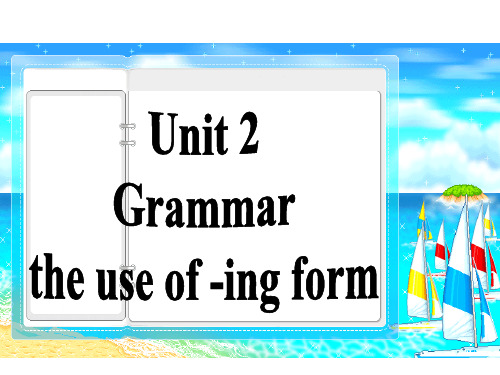
三、功能及用法
ቤተ መጻሕፍቲ ባይዱ
②用it作形式主语,把真正的主语v-ing结构移置句 尾。但这种句子形式有一定的限制,作表语的只能 是某些形容词或少数名词:worth; useless; no good;
no use等。 making (make) the effort. It’s worth ________ arguing (argue) with him. It was no good _________ 常用v-ing形式作主语的句型有: It be worth doing … 值得做…… It be no good / no use doing … 没有好处做…… It be a waste of time doing … 浪费时间做……
二、v-ing 形式的构成
主动形式 一般式 not doing not having done 被动形式 not being done not having been done
完成式
三、功能及用法 1.作主语。v-ing作主语时,句子常有两种形式: ① v-ing直接置于句首作主语。 ___________ (find) ways to grow more rice has been Finding his life goal. Spending (spend) money on himself or _________ leading __________ (lead) a comfortable life also means very little to him. dreaming (dream) for things, however, costs Just ___________ nothing.
(read). 只接v-ing形式作宾语的常用动词有: enjoy、dislike、miss、avoid、escape、mind、 imagine、practise、deny等。
- 1、下载文档前请自行甄别文档内容的完整性,平台不提供额外的编辑、内容补充、找答案等附加服务。
- 2、"仅部分预览"的文档,不可在线预览部分如存在完整性等问题,可反馈申请退款(可完整预览的文档不适用该条件!)。
- 3、如文档侵犯您的权益,请联系客服反馈,我们会尽快为您处理(人工客服工作时间:9:00-18:30)。
Grammar 动词的-ing形式作定语、表语和宾语补足语一、作定语:动词的-ing形式作定语时起下列作用:1.说明被修饰名词的功能或用途,这时,一般是单个v.-ing 而不是短语,放在被修饰的名词前面。
可以转换成“for + v.-ing”短语修饰该名词。
这时的v.-ing是动名词。
e.g. a sleeping bag = a bag for sleeping 睡袋a reading room = a room for reading 阅览室a drinking cup = a cup for drinking饮用杯a writing desk = a desk for writing写字台a washing machine 洗衣机a swimming pool 游泳池a dancing hall 舞厅2.说明名词的动作、特征、或性质。
这时的v.-ing 是现在分词,它与被修饰的名词是逻辑上的主动关系。
①单个的现在分词作定语时放在被修饰名词的前面,常可转换成定语从句。
e.g. a sleeping boy = a boy who is sleepinga drinking horse = a horse which is drinkinga moving story = a story which moves peoplea terrifying sound = a sound which terrifies peoplean inspiring leader = a leader who inspires people②现在分词短语作定语时要后置,即放在被修饰名词的后面。
常可转换成定语从句。
e.g. The girl swimming in the river (who is swimming in the river) is good at dancing.Do you know the man standing / (who is standing ) at the door?The boy studying / (who is studying) in the classroom is our monitor.*作定语用的v.-ing 是动名词还是现在分词并不重要。
重要的是要掌握v.-ing 做定语的用法。
实际上,当代一些著名语法专家已把动名词和现在分词统称为v.-ing 分词而不予细分了。
二、作表语:动词的-ing 形式作表语时起下列作用:1.说明主语的内容,可换到句首做主语。
这时的v-ing 形式是动名词。
e.g. The real problem is getting to know the needs of people.Her job is teaching children to dance. = Teaching children to dance is her job.2.说明主语的特征。
这时的v.-ing 形式是现在分词。
它与主语是逻辑上的主动关系,意思是“使人...... 的”e.g. The situation is encouraging.What he said just now is confusing. (confuse).The news is shocking. (shock).能这样用的现在分词最常见的还有:astonishing, amusing, confusing, disappointing, boring, encouraging, inspiring, moving, tiring, interesting, surprising, charming, exciting, missing, puzzling, frightening...三、作宾语补足语:动词的-v.-ing形式能跟在宾语后面,对其作补充说明,因此称为宾语补足语,通常简称为“宾补”。
1. 这时的v.-ing 形式是现在分词,它与宾语是逻辑上的主动关系。
e.g. When I arrived at the reading room, I found many students reading carefully there.Children like to watch the PLA men training (train) on the drill-ground.Don’t you see a girl running (run) towards us?2.动词的-ing形式作宾语补足语,主要用于以下两类动词后:①表示感觉和心理状态的动词:see, hear, feel, smell, watch, find, listen to, notice, observe 等。
e.g. When we returned, we found a stranger standing in front of the house.Suddenly we heard someone knocking gently on the window.*在see, hear, feel, watch等感官动词后,既可用动词的-ing形式作宾补,也可以用省略to 的不定式作宾补。
用动词的-ing 形式时,表示动作正在进行;用省略to 的不定式时,表示动作从开始到结束的全过程。
e.g. I saw a boy getting on the bus. (表示动作正在进行)I saw a boy get on the bus. (表示动作的完成了)Do you hear someone knocking (knock) at the door? ( 表示动作正在进行)I heard someone knock at the door three times. ( 表示完整的动作)②表示使意义的使役动词:(have, let, keep, get, leave...) + sb./sth. + doing sth.e.g. We kept the fire burning all night long.I won’t have you running about in the room.[语法专练]I. 句型转换1. Do you know the boy who lies under the tree?. Do you know the boy lying under the tree?2.The picture that hangs on the wall is painted by my nephew.. The picture hanging on the wall is painted by my nephew.3.We can see that steam is rising from the wet clothes.. We can see steam rising from the wet clothes.4.Not until Jane got off the bus did she find her wallet was missing.. Not until Jane got off the bus did she find her wallet missing.5.Frank is very good at telling funny jokes. We are amused by him.. Frank is very good at telling funny jokes. He can be very amusing.II. 用括号所给词的正确形式填空。
1.Do you know the name of the play being put on (put on) now?2.Her job is keeping (keep) the lecture hall as clean as possible.3.Returning (return) to my apartment, I found my bag missing. (miss).4.Did you hear the dog downstairs barking (bark) for most of the night?5.A cook will be immediately fired if he is found smoking (smoke) in the kitchen.6.Helen had to shout to make (make) herself heard (hear) above the sound of the music.7.The bell indicating(indicate) the end of the period rang, interrupting(interrupt) our heated discussion8.The volleyball match was so exciting (excite) that we all got excited (excite) after watching it.9.We heard then quarreling (quarrel)about money after the concert. They looked very angry.10.The villagers saw the fire burning(burn) brightly in the distance. When they hurried there, they found some houses burned/burnt (burn) to the ground already.11.I don’t see anyone take (take) away your paper. It might have been flown by the wind.12.During the days to come (come) we’ll make food preparations for the sports meeting,13.Einstein was on of the greatest scientist respected (respect) by the people.14.We were all very surprised (surprise) at the news. I found it very surprising.15.He gave us an inspiring (inspire) speech. We were all inspired (inspire).III. 单句改错1.I was confusing by his strange questions.confused2.The dish smelt good was cooked by my mother.Smelling3.The boy went home, sad with his money stealing.stolen4.He was so thirsty that he drank a lot of boiling water.boiled5.Looking at his exciting look, I knew he hadn’t calmed himself down.excited6.I am looking forward to visit Charlie Chaplin Museum in Switzerland next week.visiting7.Charlie’s nonverbal humor often makes people bursting with laughter.burst。
